How NFL teams got their names: origin, dates and stories behind the nicknames
Only half of the current 32 National Football League teams retain their original nicknames and cities as we dive into the history behind each of them.
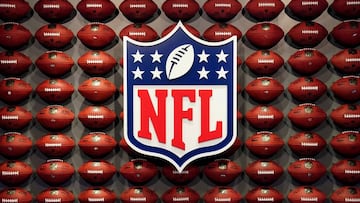
Out of the current 32 NFL teams, would you believe that only half are called by their original nicknames as well as still being located in their initial home? There are actually only five teams that haven’t moved cities or rebranded their identities. Find out the whos, hows, and whys as we delve into the origins of each of the franchises.
NFL teams: names, locations and history
Arizona Cardinals
Founded in 1898 in Chicago, the Cardinals were named the Racine Cardinals – after the street where they played their home games. The origin of Cardinals’ name came from founder Chris O’Brien when he received a shipment of faded maroon jerseys that he called “Cardinal red.” In 1944, the Cardinals and the Pittsburgh Steelers combined to form “Card Pitt” during the last full year of World War II. In 1950, they moved to St. Louis, and it wasn’t until 1999 that they settled in Phoenix, AZ, and became the Arizona Cardinals.
Their chirpy cardinal bird logo, now represented by the mascot Big Red, was added in 1947 while the team was still up north, where cardinals are more common, though you can spot them in Arizona.
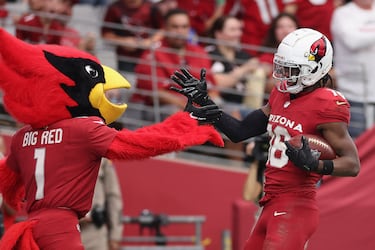
Atlanta Falcons
The Falcons were always the Atlanta Falcons; they did not move or change names. When a contest was held to name the team, several suggested “Falcons,” but there was one specific entrant who was declared as the winner, Julia Elliott. The reason was because of what she wrote, “The falcon is proud and dignified, with great courage and fight,” Elliott wrote. “It never drops its prey. It is deadly and has a great sporting tradition.”
A fun fact to note is that Elliott won four season tickets for three years and received an autographed football by the 1966 team.
Baltimore Ravens
Founded in Cleveland by Art Modell, the Cleveland Browns became the Baltimore Browns after moving to Baltimore. The NFL franchise chose the name “Ravens” because of a poem by the respected writer Edgar Allan Poe, who had been one of Baltimore’s most famous former residents.
Buffalo Bills
The Bills were known as the ‘Buffalo All-Americans,’ then the Bisons before a fan contest to rename the team was held in 1947. In 1946, an AAFC franchise was newly formed. When the AAFC Bills went defunct, owner Ralph Wilson honored them by naming his franchise the “Buffalo Bills.”
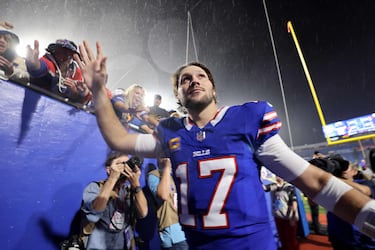
Carolina Panthers
The Panthers entered the NFL league in 1995. Their nickname was chosen from the very start and has stayed the same since. Jerry Richardson, the team president at the time, had a son who believed in the importance of a “synergy” between a team’s name and its colors. Mark chose the “Panthers” to represent the strength and power his team was going after, with the colors black, silver, and blue.
Chicago Bears
The Bears were the ‘Decatur Staleys’ until they moved to Chicago in 1921. Already having moved, they decided to change Staleys to the Bears since the town’s MLB team was called the Chicago Cubs.
Cleveland Browns
The Browns were named after their first coach, Paul Brown, who was not highly enthusiastic about the idea at first but eventually agreed to it. This was not the first nickname Cleveland chose, however. In 1950, the franchise conducted a “name-the-team” contest that drew the name “Panthers.” A local businessman at the time told management that he owned rights to the name “Cleveland Panthers” (the Panthers were members of the first AFL in 1926). From there, fans and media suggested and kept referring to the team as “Brown’s team.”
Another story behind the nickname was that it was in relation to boxer Joe Louis, who had the nickname “Brown Bomber.” While even Paul Brown himself sometimes coyly offered this up as an alternative to the team being named after him, most would put the Joe Louis story down as little more than an urban legend.
Cincinnati Bengals
General manager Paul Brown also played a role in Cinicinnati’s franchise. In 1966, the city that has always had a rich history in pro football approved the construction of a stadium of over 60,000 seats, Riverfront Stadium. Brown wanted to name the team something that related to Cincinnati’s rich football history, and with several fans suggesting “Bengals,” he picked it as the most fitting nickname.
Dallas Cowboys
The Cowboys, who started in 1960, were originally named the “Steers” by the league. The team’s manager at the time, Texas E. Schramm, decided to call them something that would not be subjected to ridicule, and that’s when he renamed them the “Rangers.” Because there was another local baseball team with the same nickname, Schramm decided on the final name, “Cowboys,” which he thought was catchy enough.
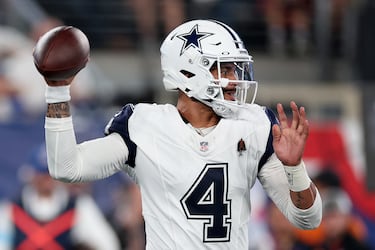
Denver Broncos
The Denver franchise was another charter member of the AFL in 1960. Like several other teams, their nickname was chosen from a “name-the-team” contest, with the “Broncos” being the most submitted. It wasn’t random, though, since there was an MLB team with the same nickname in 1921.
Detroit Lions
The Lions went by the “Portsmouth Spartans” from 1930-1933, where they trained at the Spartan Municipal Stadium on the banks of the Ohio River. After moving to the Motor City, Detroit, the team changed its name to the Lions, after the town’s MLB “Tigers” team.
Green Bay Packers
The Wisconsin team has not changed nicknames or cities since they started. Team founder Curly Lambeau worked for the Indian Packing Company, which sponsored the Green Bay franchise, providing equipment and more. The nickname “Packers” has stayed with the team till today.
Houston Texans
In 2000, the previous ‘Houston Oilers’ were revived by owner Bob McNair to become the “Texans.” He preferred the simple ‘Texans’ over the suggested Apollos and Stallions.
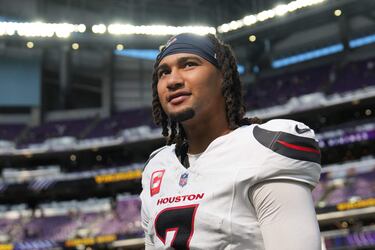
Indianapolis Colts
Indiana’s NFL franchise first started in South Florida in 1946, then moved to Baltimore in 1950. The franchise was referred to as the ‘Baltimore Colts’ from 1953-1983. They then moved from Baltimore to Indianapolis in 1984 by its owner, Bob Irsay- the current owner’s father. The team was named the “Colts” in honor of the area’s history of horse breeding.
Jacksonville Jaguars
Unlike the Miami Dolphins (see below), who entered the AFL as the first expansion team in 1966, the Jaguars were one of the final expansion teams in the NFL. Their nickname was also chosen due to a “name-the-team” contest that threw up several different names: Sharks, Stingrays, and Panthers. They randomly decided on the Jaguars.
Kansas City Chiefs
The franchise was known as the ‘Dallas Texans until they moved to Kansas City for the 1963 AFL season. The name change signified the Native Americans and the mayor at the time, whose nickname was “Chief.” It has not changed since.
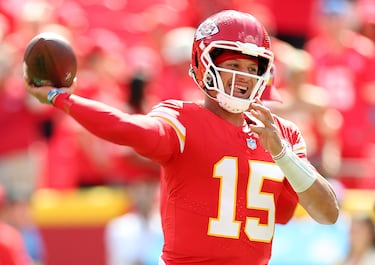
Las Vegas Raiders
The Raiders were a charter member of the AFL in 1960 and merged with the NFL in 1970. They were first named “Señors” in a “name-the-team” contest by Chet Soda. The name was dropped a few weeks later, and the franchise became the Los Angeles “Raiders,” having played in Los Angeles and Oakland, CA. On January 22, 2020, the Raiders moved to Las Vegas and became the Las Vegas Raiders.
Los Angeles Chargers
The Chargers were born in 1960 in Los Angeles as members of the AFL - American Football League. They moved to San Diego and were the “San Diego” Chargers from 1961 to 2016 until they relocated back to where they started, Los Angeles, in 2017. Their title came from a contest with their team manager, Barron Hilton, sold on the name “Chargers” immediately. He also wanted to attract more “chargers” fans and have a more memorable brand.
Los Angeles Rams
The Rams started in Cleveland in 1936. They moved to the Los Angeles area from 1946 to 1994, then moved to St. Louis in 1995 and became the St. Louis Rams. It wasn’t until 2016 that they relocated back to California as the ‘Los Angeles Rams.’ The Rams got their nickname as a result of their general manager, Damon Wetzel, having a favorite football team, the Fordham Rams.
Miami Dolphins
The Dolphins entered the AFL as the first expansion team in 1966. A “name-the-team” contest with over 20,000 entries brought the nickname most suggested by more than 600 fans, the Dolphins. At the time, Joe Robbie, Miami’s owner, claimed that dolphins were one of the smartest and fastest creatures in the sea, and it seemed fitting to his Miami team.
Minnesota Vikings
The Vikings are another team that has not moved cities or changed nicknames. Since birth in 1961, they have taken after their state’s name and what it stands for as a hub for Scandinavian-American culture.
New England Patriots
Another franchise that began as a charter member of the AFL in 1960, and another team that has not moved city or changed nickname. The team that has always played in Boston got their nickname “Patriots” from fans, which suggested the area’s role in the American revolution. Even though the team did not change its nickname, they were known as the ‘Boston Patriots’ before NFL owners decided a more regional team label would help bring more fans, so they agreed on “New England” in 1971.
New Orleans Saints
In 1966, the Saints were created in New Orleans due to the AFL-NFL merger. The name “Saints” was picked as New Orleans has a large population of Catholics, and it only seemed fitting to name the team after the All-Saints Day holiday, which was the day the franchise became official- November 1, 1966.
New York Jets
Like many teams, New York was a member of the AFL in 1960. The franchise was known as the “Titans” from 1960 to 1962 when they played at the Polo Grounds. After moving to the Shea Stadium in 1963, they were called the ‘Jets’ to represent the aircraft in the skies above.
Philadelphia Eagles
The Eagles were created when the Frankford Yellow Jackets went defunct. In 1943, they merged with the Pittsburgh Steelers as the country was recovering from the Great Depression and were known as the “Steagles.” The team’s nickname came from Bert Bell, who was inspired by the government organization’s logo, the eagle, as it gave him a sense of hope and optimism.
Pittsburgh Steelers
During World War II, the team merged with the Eagles to become the “Steagles,” as we said above, and then merged with the Chicago Cardinals the following season as “Card-Pitt”.
Later, after owner Art Rooney and former owner Bert Bell swapped the Steelers and the Eagles around until they each settled with their own. Rooney went on to choose the name “Steelers” in 1940 to honor all the steel workers, fans, and city.
San Francisco 49ers
This franchise is another one of the few teams that haven’t changed cities or nicknames. The title “49ers” came as an honor to the men who were part of the 1849 gold rush in the Sierra Nevada.
Seattle Seahawks
This franchise held a “name-the-team” contest with over twenty thousand entries. “Seahawks” was suggested by over 100 entrants, with the franchise deciding these fierce predatory seabirds that symbolize aggressiveness were a perfect fit for the team.
Tampa Bay Buccaneers
This one’s interesting. In the early 19th century, Florida’s western coast was constantly invaded by a Spanish pirate, Gasparilla. The franchise chose a name from a huge list related to the local pirate legend and decided on the “buccaneers.” Today, a festival held annually in January celebrates the “Gasparilla Pirate” invasion and draws thousands of parties.
Tennessee Titans
In 1960, the “Houston Oilers” were born in oil-rich Houston as an original American Football League (AFL) member. In 1997, the team moved to Memphis and became the “Tennessee Oilers,” and a season later, they played their home games in the city of Nashville. Nashville was known as the “Athens of the South,” and owner Bud Adams decided to take after “Titans” from a list of heroic qualities. Later, he nicknamed the team after the state of Tennessee and not the city of Nashville.
Washington Commanders
This franchise was founded in Boston in 1932 as the “Boston Braves.” They became the “Boston Redskins” when all the Native American players on the team disliked what the name stood for. The franchise’s owner at the time, George Preston Marshall, moved the team to Washington, D.C., and kept its nickname. Years later, in July 2020, the franchise changed its name to the “Washington Football Team,” with the Redskins name being widely seen as offensive to Native Americans. The latest incarnation sees them dubbed the Commanders, a sort of homage to the U.S. military.
And there you have it: all 32 teams’ nicknames and the story behind each franchise’s name decision process. With rumors about a change to the Commanders already circling, and an uncertain future for others, we’ll be back to update this if anything moves.
Related stories
Get your game on! Whether you’re into NFL touchdowns, NBA buzzer-beaters, world-class soccer goals, or MLB home runs, our app has it all.
Dive into live coverage, expert insights, breaking news, exclusive videos, and more – plus, stay updated on the latest in current affairs and entertainment. Download now for all-access coverage, right at your fingertips – anytime, anywhere.
Complete your personal details to comment